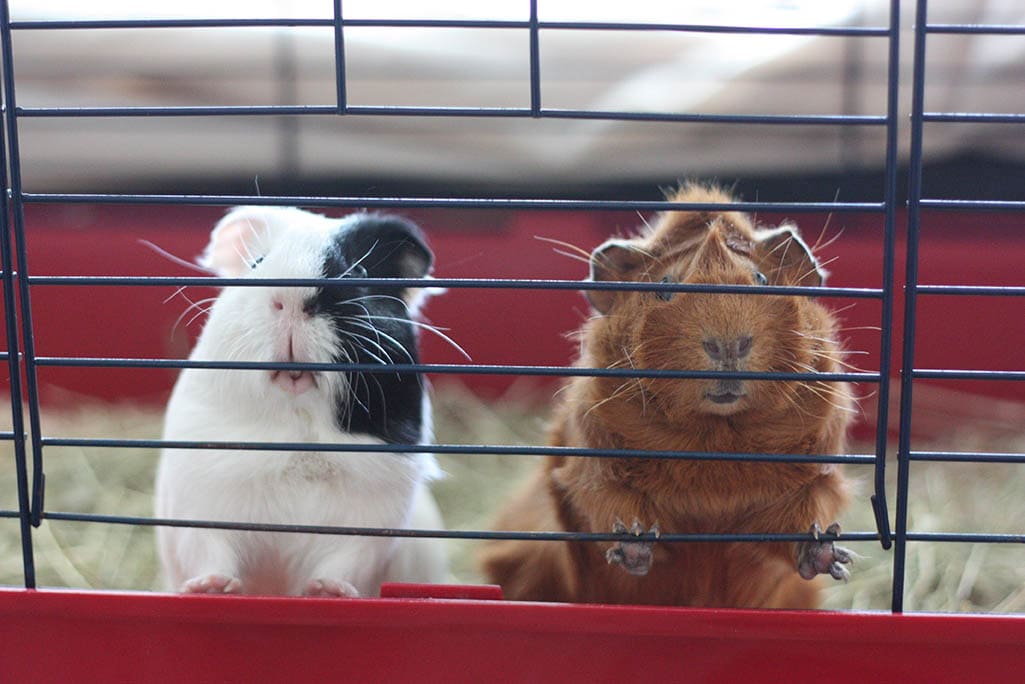
Click to Skip Ahead
If you’re a proud guinea pig owner, you’ve probably been curious about the best foods to feed your furry friend. Guinea pigs have unique dietary needs, and it’s essential to provide them with a balanced diet for their overall health and well-being. When it comes to apples, one common question that arises is whether guinea pigs can eat apple skin. Well, the answer is yes! Guinea pigs can indeed enjoy the crunchy and nutritious apple skin as part of their diet.
Let’s dive right into this topic and explore the benefits and considerations of feeding apple skin to your adorable guinea pig!
The Guinea Pig Diet
Before looking into the specifics of apple skin, it’s crucial to understand the general dietary requirements of guinea pigs. Guinea pigs are herbivores, which means their diet primarily consists of fresh fruits, vegetables, hay, and pellets. A balanced guinea pig diet should include a variety of fruits and vegetables to provide them with the necessary vitamins, minerals, and fiber they need to stay healthy.

Is Apple Skin Healthy for Guinea Pigs?
Apple skin is not only safe but also a healthy addition to your guinea pig’s diet! The skin of an apple contains valuable nutrients, including vitamins, minerals, and dietary fiber. These nutrients are beneficial for your guinea pig’s digestive system, overall health, and immune system.
Apple skin is packed with essential nutrients that can contribute to your guinea pig’s well-being. It contains vitamins such as vitamin C, which is crucial for their immune system and overall health. Additionally, apple skin provides dietary fiber that aids digestion and helps maintain a healthy weight for your guinea pig. Minerals like potassium and antioxidants are also present in apple skin, contributing to their overall nutrition.
Feeding apple skin to your guinea pig can also have several benefits. The dietary fiber in apple skin promotes healthy digestion, preventing digestive problems such as constipation. Vitamin C strengthens their immune system, reducing the risk of illness.
The antioxidants present in apple skin help fight off harmful free radicals, supporting your guinea pig’s overall well-being. To add to the benefits, the crunchy texture of apple skin can also provide enrichment and stimulate their natural foraging instincts!
Are There Any Risks of Feeding Apple Skin to Your Guinea Pig?
Feeding apple skin to your guinea pig can be a healthy and enjoyable addition to their diet, but note that it’s important to be aware of the risks associated with feeding too much apple skin to your furry friend. Here are some potential risks to consider:
Digestive Upset
While apple skin is a good source of dietary fiber, excessive consumption can lead to digestive issues in guinea pigs. Too much fiber can cause diarrhea, gas, or bloating. It’s crucial to introduce apple skin gradually and monitor your guinea pig’s response to ensure their digestive system.
High Sugar Content
Apple skin contains natural sugars, which can contribute to weight gain and other health issues if consumed excessively. Guinea pigs are prone to obesity, so it’s important to limit their sugar intake, including that from fruits like apples. Too much sugar can lead to obesity, dental problems, and even diabetes in guinea pigs.

Pesticides
Like many other fruits, apples may also have been treated with pesticides during cultivation. Even though washing the apple skin can reduce pesticide residue, it’s essential to choose organic apples whenever possible to minimize the risk of exposing your guinea pig to harmful chemicals.
Nutritional Imbalance
Although apple skin is nutritious, it should not replace the main components of a guinea pig’s diet. Guinea pigs require a balanced mix of hay, pellets, and fresh vegetables for optimal nutrition. Feeding too much apple skin can lead to a nutritional imbalance, as it should be considered a supplement or occasional treat rather than a staple food.
How Should You Feed Apple Skin to Your Guinea Pig?
Before offering apple skin to your guinea pig, ensure that you wash the apple thoroughly to remove any potential pesticides or contaminants. Slice the apple into thin, bite-sized pieces, making it easier for your guinea pig to chew and digest. Remember to remove the core and seeds before serving the apple skin to your furry friend. Introduce apple skin gradually into their diet to monitor their response and avoid any potential digestive issues.
How Much Apple Skin Should You Feed Your Guinea Pig?
When it comes to feeding apple skin to your guinea pig, like all other fruits and veggies, moderation is key! While apple skin is a nutritious treat, it should only be given in small amounts. A few small slices of apple skin once or twice a week are sufficient to provide the nutritional benefits without overloading their diet.

Can Guinea Pigs Eat Apple Flesh?
Yes, guinea pigs can eat the apple flesh too! Apple flesh is a juicy and tasty treat for your furry friend. It contains similar nutrients as apple skin, such as vitamins, minerals, and dietary fiber. However, it’s important to remember that apples should be fed to guinea pigs in moderation as a treat, alongside their regular diet.
Can Guinea Pigs Eat the Apple Core?
While the apple core itself is not toxic to guinea pigs, it is best to avoid feeding them the core. The core and seeds can pose a choking hazard and are not easily digestible for guinea pigs. It’s advisable to remove the core and seeds before offering apple slices to your furry companion.
Can Guinea Pigs Eat Apple Seeds?
No, guinea pigs should not consume apple seeds. Apple seeds contain small amounts of cyanide, which can be harmful to their health if consumed in large quantities. They also present a choking hazard. To ensure the safety of your guinea pig, always remove the seeds before feeding them apple slices.
What Other Fruits Can Guinea Pigs?
In addition to apples, guinea pigs can enjoy a variety of other fruits. Some safe and healthy fruit options for your guinea pig include the following:
Although guinea pigs are considered herbivores and have a diet that naturally contains fruits, remember to introduce new fruits gradually and in small portions to avoid any digestive upset!
Final Thoughts
Guinea pigs can safely eat apple skin as part of a balanced diet. Apple skin provides valuable nutrients, vitamins, and dietary fiber that promote their digestive health and overall well-being. Remember to offer apple skin and other fruits in moderation, alongside their regular diet of hay, pellets, and fresh vegetables.
By providing a varied and nutritious diet, you’ll keep your guinea pig happy, healthy, and content for years to come. So go ahead, share a slice of apple skin with your furry companion and watch them enjoy this delightful and nutritious treat!
Featured Image Credit: jacqueline macou, Pixabay









